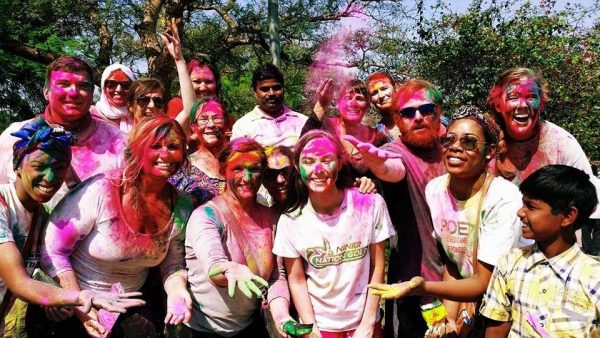Public Health, Social Work Students Travel to India

It’s the world’s largest democracy—a country that has recently seen significant shifts in its economic, cultural, and political landscapes. It’s also a place where deeply embedded ideas about social class and gender equality make life difficult for many.
India’s complexities, and the innovative ways its people have found to respond to them, make it a learning environment that is both challenging and rewarding for America’s future health professionals.
In late February, a group of public health and social work students embraced that reality and traveled there. Led by Dr. Shanti Kulkarni and Dr. Beth Racine, the trip marked the first time a group of CHHS students had traveled together to India.
Kulkarni is a professor in the Department of Social Work. She said India’s position in a globalizing world should draw our attention.
“India is such a unique and important player on the world stage. As global citizens, it’s important for us to understand and engage in what is happening there for so many different reasons.”
India is one of the BRICS nations (along with Brazil, Russia, China, and South Africa), five large, emerging economies that analysts believe will have major impact on the world in coming decades.
Over the weeklong trip, the group explored health, empowerment, and gender equity in India, working closely with faculty and students from the Jamia Milia Islamia (JMI), a well-respected university in Delhi. They also traveled to two different regions of India to visit NGOs working to empower vulnerable populations, and took in the sights in Delhi and Jaipur City.
Social work master’s student Diana Green said she was drawn to the trip by the questions it sought to address.
“I’m very interested in gender issues here in the United States, and I’d followed the recent sexual assaults in India with interest, so being able to visit the country and learn about their perspective and solutions seemed perfect,” she said. “It’s heartening to hear about how others are dealing with these big issues, since they often seem impossible.”
Dr. Kulkarni said India’s approach to social problems diverges from the individualist model favored in America.
“Social problems, such as violence against women, are seen much more as a failure of family or community. Interventions there are designed to engage the broader social networks that people are embedded in, including the extended family, neighbors, and faith communities. Some of these approaches could be very effective in the U.S., especially for individuals and groups whose collectivist values and social networks are strong,” she said.
Students studied those approaches and prepared to travel to India during the fall semester. Kulkarni said a trip like this is intense, and the work in the classroom helps students be ready.
“You are thrust into a new environment quickly. We tried the best we could to prepare students in advance to have some context for their experiences. We wanted them to have some understanding of the social, cultural, economic, and health issues that they would be observing and experiencing.”
Green, the social work student, said the program brought an expanded outlook, and with it, optimism.
“Visiting India proved as a reminder that our situation here is not something inherent in being humans, because the situation is so different in India!
We are not alone, and it is important to have a sense of perspective when tackling big issues. We can all learn from each other, and the United States is certainly not special in our need to work with other countries on difficult issues.”